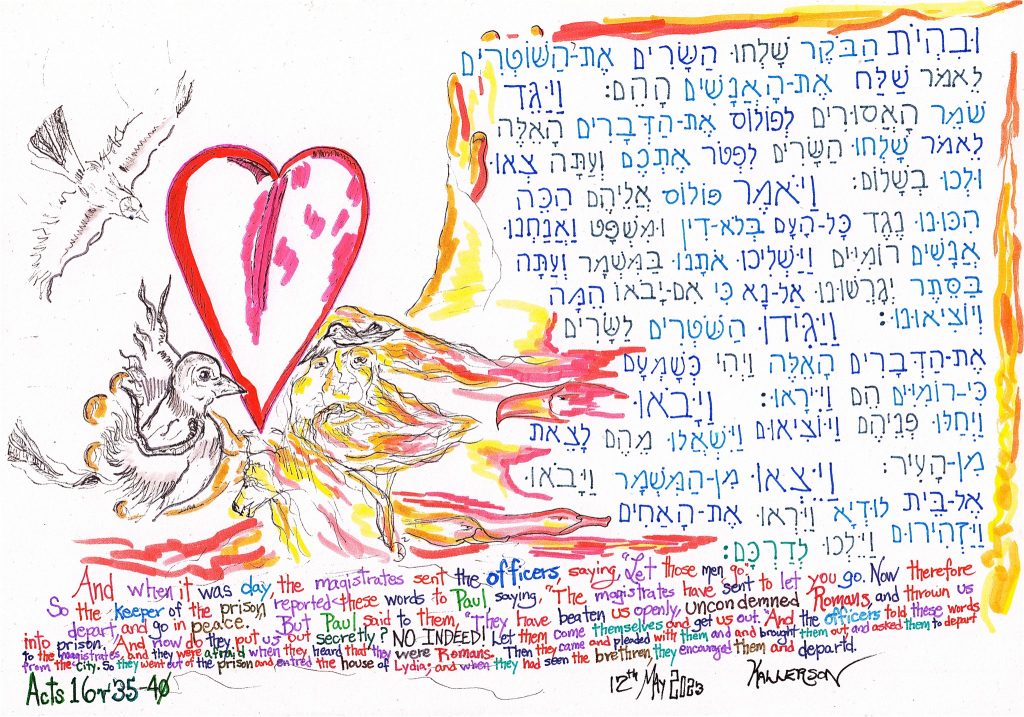Artwork by Douglas Kallerson
Tuesday, 16 May 2023
And when it was day, the magistrates sent the officers, saying, “Let those men go.” Acts 16:35
Note: You can listen to today’s commentary courtesy of our friends at “Bible in Ten” podcast. (Click Here to listen)
You can also read this commentary, with music, courtesy of our friends at “Discern the Bible” on YouTube. (Click Here to listen), or at Rumble (Click Here to listen).
In the previous verse, Paul and Silas were served by the jailor, and they along with the household rejoiced. Luke now continues with, “And when it was day.”
One can assume that after eating, everyone finally got a chance to sleep. For Paul and Silas, that had not come all night. For the jailor and his household, they probably slept until the earthquake and then were awakened after that. With whatever late-night sleep they got, at whatever the normal hour for beginning the day arrived, it next says that “the magistrates sent the officers.”
It is speculated that the earthquake may have alarmed the magistrates, thinking it was judgment from the gods that they had allowed the multitude to rise up against the missionaries without a trial. Then the magistrates also joined in by having the men beaten with rods. This is not unfounded speculation. Luke notes that the magistrates did this “when it was day.”
Luke’s precision of record-keeping would have indicated if it were mid-morning, noon, or some easily recognizable time. Rather, it appears that as soon as the day was getting started, the magistrates made this their first point of business.
As for those they sent, the Greek word is rhabdouchos. Literally, rod-bearers. These were probably the same men who had beaten Paul and Silas the day before by order of the magistrates. As for their duties, Vincent’s Word Studies explains –
“They preceded the magistrates one by one in a line. They had to inflict punishment on the condemned, especially on Roman citizens. They also commanded the people to pay proper respect to a passing magistrate, by uncovering, dismounting from horseback, and standing out of the way. The badge of their office was the fasces, an axe bound up in a bundle of rods; but in the colonies they carried staves.”
It is these rod-bearers that have come, saying, “Let those men go.” Vincent’s notes that the order of the Greek indicates contempt, “those men.” Whether of contempt or hurried fear, the order is given to release them at an early hour of the day.
Life application: A guilty conscience will work on a person throughout the night. But that is not a bad thing. It is the person who has done wrong and yet sleeps soundly that is the real problem. Once a conscience is seared over having mistreated others, anything is possible. Millions of people who just wanted to live out their lives have been snuffed out by people without any conscience toward their wrongdoing.
Those in government and unelected positions of power around the world commit crimes against the masses and yet dine with joy and sleep contentedly. As believers, we need to constantly refresh our hearts and minds concerning how we talk to and treat others.
Each person is an individual and, whether we agree with them or not, it is right that we should feel remorse when we wrongly treat another. That is what the hours of the night can be used for. Let us evaluate our treatment of others and attempt to keep our consciences from becoming seared to things they should be softened to.
Lord God, help us to interact properly with those we encounter. We will inevitably have times when we disagree with others and say things that we later regret. May we never allow our consciences to become hardened towards our actions that are wrong. Instead, may we consider such things and determine to not continue along those paths. Amen.

